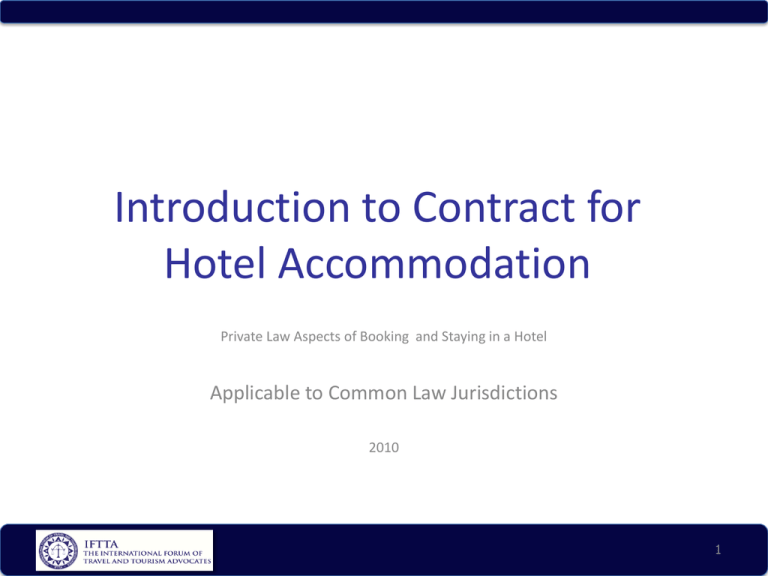
Introduction to Contract for
Hotel Accommodation
Private Law Aspects of Booking and Staying in a Hotel
Applicable to Common Law Jurisdictions
2010
1
Terms and Conditions of Use
These slides are intended for use as a teaching
resource for teachers of tourism, travel and
hospitality law and for no other purpose.
They are not intended for any use in relation to real
or anticipated legal proceedings.
No liability is accepted by IFTTA or its agents or any
contributors to these slides in relation to the content
or use of these slides.
Terms and Conditions …
It is a condition of the use of these slides that:
the role of IFTTA in preparing these slides is acknowledged
the slides are not altered in any way
no reliance will be placed on the content of these slides in
relation to any legal proceedings
no claim will be made against IFTTA or its agents or any
contributors in relation to these slices.
Main Headings
I. Introduction
II. Making the Contract of Accommodation
Booking a hotel
III. The Terms of the Contract
Staying in a hotel
IV. Breach of Contract
Remedies for not keeping contract promise
4
I. Introduction
Booking a hotel bedroom and staying in the hotel
gives rise to legal rights and duties for hotel and
consumer
Slides focus:
on legal framework or sources/types of rights/duties
linking hotel and consumer
on private, not public law duties
In civil law jurisdictions (typically non-Englishspeaking) rights/duties are found primarily in
written legislation
5
Introduction
In common law jurisdictions (English-speaking
states) rights/duties are also found in case-law
(previous court judgements - precedents)
The legal framework which identifies
hotel/consumer rights/duties and decides if they
have been observed/broken is a mix of:
Contract law
Other laws
6
Contract Law
Contract law is the main part of the legal
framework linking hotel and consumer
Its role is to:
decide when a booking creates a contract
what the contract rights/duties are (what each side
must do)
identify when rights/duties are not observed (the
contract is broken)
identify the legal consequences of breach of contract
7
Other Laws
Varies depending on state and legal system
General consumer protection law which:
Controls unfair B2C pre-contract activities
(marketing, advertising, website content, booking
procedures)
Controls unfair B2C contract terms (bans them)
Forces display of information
8
Other Laws
Sometimes states have specific hotel laws
which:
Promote hotel standards/quality (through
hotel registration/grading)
Deal with rights of service/admission,
compensation for physical injury and property
loss/theft
Usually no specific hotel laws for, say, online
bookings
9
Other Laws
Data protection laws
General civil liability laws (tort/delict)
Constitutional/human rights laws
Building standards/construction laws
Food hygiene laws
10
Other Laws
Equity law – (in common law jurisdictions)
legal principles based on fairness/justice
which shadow contract law to prevent
injustice
e.g. sometimes forcing a hotel (only if its fair)
to respect a non-paid understanding to give
‘first call’ on bedrooms to a tour operator or a
function room for a wedding
11
Other Laws
Historically hotels (old English term - inns) were
subject to a legal duty to admit/serve ‘travellers’
Duty based on status, not contract
In effect a pre-contract duty to make a contract of
accommodation
In some states same duty now also based on
legislation
Law also says hotel can refuse to admit for
reasonable grounds
Other Laws
Specific equality laws in many states now also
ban refusals by all retailers (including hotels)
to admit/serve customers for listed reasons
Banned reasons typically include race,
ethnicity, nationality, politics/religion, sex,
sexual orientation, age, family status etc
Basic Contract Law says
An agreement between hotel and consumer to
provide the use (allow short-term occupancy) of a
hotel bedroom (‘sell’ the room) in return for
payment creates a legally binding contract
Meaning legal remedies are available from courts
if contract not performed as agreed
14
Basic Contract Law says
Booking a hotel bedroom means making a
contract to be performed in the future
A booking does not have to be in writing to create
a valid contract
A phone booking can create a valid contract, but this
might not be wise because …
Hotels/consumers are generally free to make their
contracts/structure their booking procedures as
they wish
Lawyers/judges search for parties intentions as
key to resolving contract disputes
15
Basic Contract Law says
But this freedom is subject to various rules
dealing with, say:
making illegal contracts (selling a bedroom for
prostitution, selling liquor to under-age
children via bedroom mini-bar)
making a mistake (booking wrong dates/type
of bedroom/hotel)
under-age children making a booking
16
Basic Contract Law says
Contract for accommodation consists only
of what was agreed before or when the
booking was made
Hotel cannot afterwards unilaterally insert
extra terms (typically hotels’ written
standard contract terms) into contract, say,
via a confirmation or invoice
17
Basic Contract Law says
Unless consumer stayed in hotel before and knew about
the terms
Online hotel booking makes it easy for hotel to include all
of its standard terms before booking is made because …
Contents of a contract of accommodation are called
terms:
Express terms (mentioned)
Implied terms (not mentioned, but part of contract for
various reasons discussed later)
18







